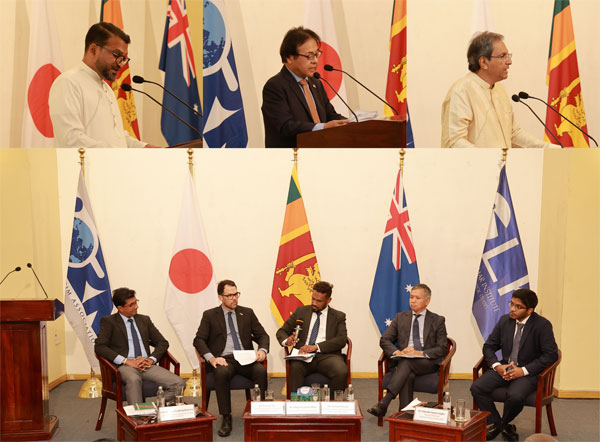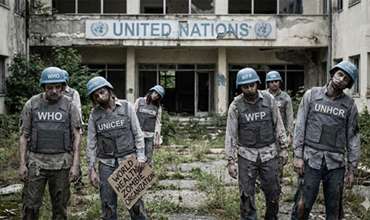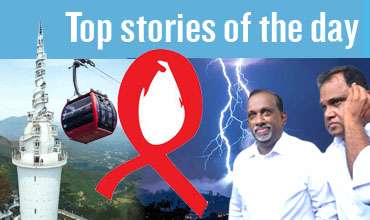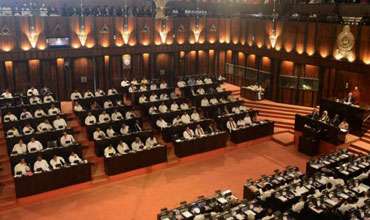Enhancing Disaster Risk Management and the Climate Response in IORA countries emphasized at panel discussion at LKI

The Lakshman Kadirgamar Institute, in collaboration with the Embassy of Japan and the Australian High Commission in Sri Lanka hosted a panel discussion titled, “Enhancing Disaster Risk Management and the Climate Response: Collaborative Efforts by Japan and Australia in Indian Ocean Rim Association (IORA) Member Countries” on 28 March 2024. It was attended by Ambassadors and diplomats representing IORA member states and dialogue partners, representative of International Organisations, senior officials of the Ministry of Foreign Affairs and other relevant Ministries and agencies, policy practitioners, civil society activists and university students.
Welcoming the gathering Executive Director of the LKI Ambassador Ravinatha Aryasinha, outlined the activities undertaken by the institute in support of Sri Lanka’s IORA Presidency - through provision of substantive inputs, policy briefs on concerned issue areas, and collaborative events held with Japan and the EU. He emphasized the importance of Japan - a dialogue partner, and Australia - a member of IORA, collaborating with LKI in hosting this event to share their specific experience in supporting member countries. He called for greater tangible support towards IORA, by particularly Dialogue Partners, and said as with many other successful regional organisations, through collaborating on such functional issue areas, IORA too in future could also cooperate on more complex issues of significance to the region and the global community.
The Ambassador of Japan to Sri Lanka Mizukoshi Hideaki, noted that following the adoption of the Sendai Framework Japan had taken an active role in spearheading IORA’s Disaster risk preparedness efforts, and reiterated the importance of drawing in the correlation between climate change and the increase in the number and severity of natural disasters. He said Japan has provided advanced technologies such as earthquake and tsunami observation instruments and early warning systems to IORA members like Malaysia and Indonesia, design and construction of flood-resilient buildings and infrastructure in countries like Thailand, and in the case of Sri Lanka steps are being taken to establish a meteorological doppler radar system that is designed to enhance pre-disaster preparedness for natural disasters. He appreciated the continuing collaboration with the LKI in helping to strengthen Japan’s relations with Sri Lanka and the region.
Delivering the keynote address, State Minister of Foreign Affairs Tharaka Balasuriya, while commending the LKI’s support to Sri Lanka’s IORA presidency and for collaborating with Japan and Australia to broaden the scope of multilateral cooperation, reiterated the need for nations within this region to equip themselves to adapt, prevent, and mitigate both natural and manmade disasters. Noting that the Indian Ocean was a vital conduit for global maritime trade and vulnerable to a myriad of maritime disasters both natural and man-made, he said its affects are equally felt by Sri Lanka. In this regard, he thanked the Governments of Japan and Australia for their continued assistance in strengthening regional disaster preparedness regimes and maritime security. The Minister reiterated that as the current chair of the Indian Ocean Rim Association, Sri Lanka remains committed to fostering partnerships and unity among member states and international allies, working collectively to bolster resilience and security in the region.
The subsequent panel discussion that followed was moderated by Mr. Nilupul Gunawardena, Research Fellow (Global Governance) of the LKI, and joined by four specialists in the field, Professor Terney Pradeep Kumara of the Department of Oceanography and Marine Geology at the University of Ruhuna, Dr Paul Zeccola, First Secretary (Political and Economic) at Australian High Commission in Sri Lanka, Dr Pulasthi Amarasinghe, Research Economist at Institute of Policy Studies and Mr Yamada Tetsuya, Chief Representative at Japan International Cooperation Agency (JICA) in Sri Lanka
Professor Terney Pradeep noted that ‘Natural Disasters’ and ‘Man-Made Disasters’ created problems not only to humans, but also could result in environmental damage and economic damage as well. Sri Lanka needs to have awareness and also think about how preparations can be made to avert disasters. Sri Lanka has also increasing become vulnerable not only as dumping ground for hazardous waste but also due to the transportation of such hazardous waste thorough waters in close proximity. Noting that from experiences like the Boxing day tsunami and past ecological and maritime disasters faced comprehensives plans were available in Sri Lanka, however operationalizing them in times of crisis had proved challenging. He believed IORA could provide a good platform to develop best practices in this regard, and also provide greater assistance to countries in times of crisis.
Dr. Paul Zeccola, said Australia would like to see an open, stable and prosperous Indian Ocean region, underpinned by respect for sovereignty, agreed rules and norms, including in the maritime domain. Noting its lead in maritime safety and security in IORA, he highlighted a number of initiatives spearheaded by Australia including a series of Law of the Sea workshops organised in Colombo and delivering activities under the Blue Economy Workstream including the Australian-funded IORA Blue hub. Australia is also helping strengthen maritime governance in Sri Lanka - providing vessel monitoring systems for all of Sri Lanka's 4,800 multi-day fishing trawlers, , support to Sri Lanka Customs in terms of X-ray machines, and by also provided forecasting system support.
Dr. Pulasthi Amarasinghe, highlighted the pressing climate challenges facing Sri Lanka, including rising temperatures, rainfall changes, and other extreme climate events. He said floods caused the most significant economic damage, which could be estimated to be around USD 7 billion in the last 3 decades. Dr. Amarasinghe highlighted the various impacts on the health sector, the coastal areas, migration patterns, and food security. Emphasising proactive measures, he advocated for improved information dissemination for forecasting, enhanced management and adaptation strategies and effective insurance mechanisms. Moreover, Dr. Amarasinghe warned of the perils of the climate-debt trap which developing countries face, urging for IMF and multilateral assistance, as well as public-private partnerships to mitigate economic vulnerabilities exacerbated by climate shocks, especially in the wake of large external crises like pandemics.
Mr. Yamada Tetsuya, referring to ‘resilience-building mechanisms’ under the Sendai Framework for Disaster Risk Reduction outlined four priorities JICA focused on: ‘Understanding Disaster Risk’, ‘Strengthening governance’, ‘Pre-investment’, and ‘Enhancing preparedness for effective response and to “Build Back Better”. He highlighted JICA’s global targets for which investment is channelled - first reduction of casualties and direct economic implications. Secondly, the increase of international cooperation, and finally increased access to early warning systems and access to disaster information. He noted that according to research done by the UN Office for DRR, every 1 U.S. Dollar invested in risk reduction, whether for infrastructure building or any other measures, can save up to 15 U.S. Dollars if post-disaster recovery is properly invested in.
In the Q & A session, a wide range of topics were covered by the audience, which mainly centred on the governance of the oceans and the main legal frameworks for regulation. It also included the need for a national strategy on submarine cable resilience and protection, the impact of the moratorium imposed by Sri Lanka at present on research vessels conducting research in the maritime territory of Sri Lanka, and how Sri Lanka can enhance its capacity and ways of necessary information-gathering mechanisms to avert disaster risks.
On ocean governance, Mr. Gunawardena explained that United Nations Convention on the Law of the Sea (UNCLOS), associated and relevant international agreements/conventions and applicable customary international law forms the legal framework for the governance of the seas and covers most of maritime issues arising thereof. He stressed that some countries have not ratified UNCLOS and some have sought reservations on some of the significant aspects of other relevant international agreements. Stressing the fact that international law and normative rules-based order co-exists, he further illustrated how international law provides legality to the rules-based order, especially in terms setting normative frameworks and enforcement mechanisms. He explained that in common with international law, it is premised on the values of the international community enshrined in the UN Charter, in multilateral treaties and customary rules that give effect to these values. However, he noted that there is a debate as to whether some countries are now attempting to interpret the concept of rules-based order as a discipline outside the regime of international law, as an alternative to international law.
With reference research vessels Mr. Gunawardena said that the legal frameworks that can regulate vessels with dual technologies is limited in international law while noting that under UNCLOS countries are required to fully disclose of findings to visiting countries and yet with duel technologies there is no guarantee countries will follow such procedures. Therefore, he further mentioned that the resolution of the issue would mainly depend on the honesty and transparency of the concerned parties. With reference to submarine cables, Mr. Gunawardena explained LKI’s longstanding involvement along with the UNODC with respect to seeking to develop a national framework for the resilience and protection of submarine cables, and saw it as an area where incremental success was possible. With reference to moratorium on research vessels, Professor Terney emphasized that as Sri Lanka possess limited sovereign capabilities and resources to conduct research in marine and underwater domains, the country lacks adequate data on availability of resources in the territorial waters. He further emphasized that moratorium on research vessels which is currently ongoing could hamper Sri Lanka’s national interests in the maritime domain in the long run as the country is in need of data and research pertaining to ocean domain, particularly in terms of mapping resource in the ocean. While acknowledging that at present Sri Lanka had limitations in making judgements on possible use of dual use technology by visiting research vessels, he said even military ships could have the much more advanced technology which could go undetected.
-
Still No Comments Posted.
















Leave Comments